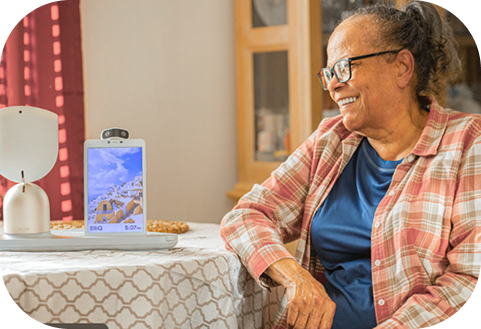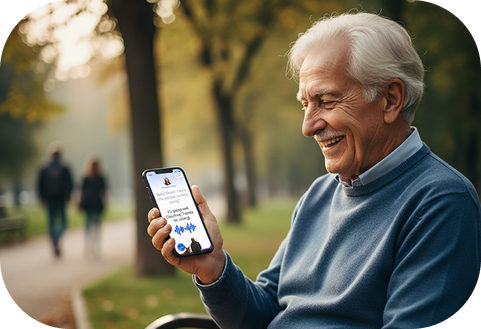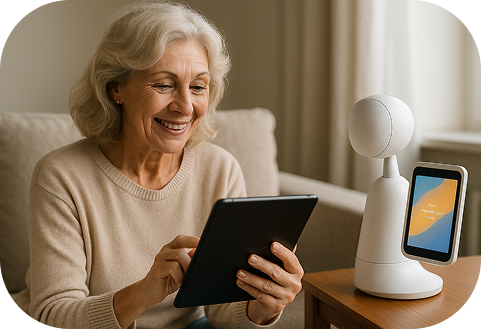Alzheimer’s Care for Seniors: How ReComune Makes a Difference?
Alzheimer’s disease is one of the most prevalent and challenging neurological conditions affecting seniors today.
Updated on: 26 Jan 2026

If you’re an adult child supporting an aging parent, you already know the stakes: you want them safe, happy, and truly connected. You want peace of mind without burning out. The good news is that companionship for seniors is changing fast. Family and friends will always be the heart of meaningful connection, but a wave of practical tools from simple video calls to surprisingly personable AI companions can now reinforce your efforts, fill lonely hours, and help you sleep at night.
This blog blends empathy with clear, doable steps. You’ll see how to craft a balanced “companionship plan” that mixes human touch with smart tech, so your parent feels seen, supported, and engaged every day.
Loneliness isn’t just a sad feeling, it’s a serious health risk. The U.S. Surgeon General warns that the mortality impact of being socially disconnected can rival smoking up to 15 cigarettes a day and it’s tied to higher risks of heart disease, stroke, dementia, anxiety, and depression (University of New Hampshire).
At the same time, the world is aging at record speed. By 2050, the proportion of people over 60 will nearly double, reshaping families, work, and care systems. That means more of us will be balancing careers, kids, and elder care and more seniors will be at risk of isolation if we don’t plan ahead (World Health Organization).
And yes, the pressure is real. In a national analysis, 67% of family caregivers said it’s hard to juggle their jobs with caregiving responsibilities. Burnout isn’t a personal failure, it’s a predictable outcome when support networks and tools aren’t in place (AARP Press).

Think of companionship as a team effort, not a solo mission. Your roster can include:
Many will. Older adults keep getting more comfortable with technology. Pew Research’s 2024 overview shows steady growth in smartphone and broadband adoption across age groups, including people 65+. That means the gateway tech (video calls, messaging, photo sharing) is increasingly within reach (Pew Research Center).
A practical hint: start with one device and one app that solves a real, felt problem (e.g., “See your grandkids every evening”). Success builds confidence.
AI companions range from voice-based helpers to tablet apps and small robots that prompt conversation, play music, run trivia, and encourage light exercise. Early research is promising: meta-analysis and reviews suggest AI-enabled and socially assistive technologies can help reduce loneliness or depressive symptoms for some older adults especially when used regularly and alongside human interaction. But evidence quality varies, and these tools are best considered supplements, not substitutes ( MDPI).
Choose based on personality fit and use-cases:
Evidence suggests these tools can reduce perceived loneliness or depressive symptoms in some settings but they work best when someone pairs them with human contact and celebrates usage (“How was your music hour with your robot?” (ScienceDirect).
Caregiving time adds up. The U.S. Bureau of Labor Statistics reports that on days when unpaid eldercare is provided, caregivers average 3.9 hours of care. Use tech to reclaim micro-moments, schedule automated check-ins, use group chats for siblings to share updates, and let AI companions entertain or cue routines while you handle logistics (Bureau of Labor Statistics).
Home support has real costs. National data show a 2024 median $34/hour for a home health aide (hands-on help), with homemaker services rising faster than inflation. If paid companionship is part of your plan, match the number of hours to the most impactful times (CareScout).



App-based solution designed for seniors to have meaningful, warm, positive and secure conversations to end lonliness (ReComune).
While Character.AI offers engaging conversations, it has notable drawbacks. Many users report inconsistent character behavior, frequent AI memory loss, and limited emotional depth over long interactions. Privacy concerns and the lack of transparency around data usage also raise issues, making some experiences feel more artificial than authentic. Additionally, other lawsuits have been filed in Texas alleging harm to minors involving the app’s content and design (National Law Review).
Care.coach, though intended to support elderly care through virtual avatars, faces criticism for lacking true emotional understanding. Users report discomfort with constant monitoring, privacy concerns over voice and video data, and limited personalization. The system’s reliance on remote human operators also raises questions about authenticity and ethical transparency. The pet avatar interacts, but there are real human Health Advocates behind it (care.coach).
Replika AI, while marketed as an emotional companion, often delivers inconsistent or superficial conversations. Users report abrupt personality shifts, dependency risks, and blurred emotional boundaries. Privacy concerns over sensitive data storage and limited transparency about AI learning methods further erode trust, making genuine human-like connection difficult to sustain.
In our journey through the evolving landscape of senior companionship, one truth remains unwavering: connection is the cure. While nothing can replace the warmth of a heartfelt visit or the laughter shared across generations, the future offers bold new tools to ensure your loved-one never feels alone. By blending family presence, community engagement, smart technology, and purpose-built AI companions, you can weave a safety net of purposeful companionship, day after day. Start with one meaningful step this week: schedule a regular video call, set up a simple photo-stream, or try an AI companion.